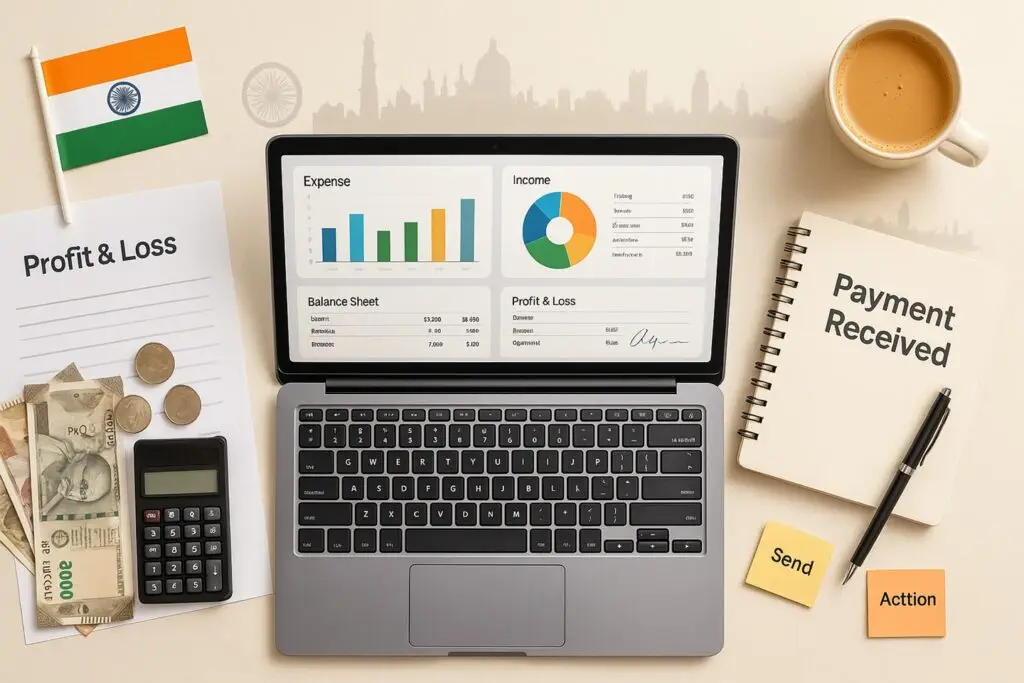Introduction – The Importance of Accounting Software for Small Businesses in India
The landscape for small business owners in India has rapidly evolved, with technology at the heart of this transformation. As markets expand and financial regulations become more complex, small and medium-sized businesses are turning to the best accounting software in India to manage everything from invoices to tax compliance. Good accounting software for small business streamlines accounting, reduces manual effort, and allows entrepreneurs to focus on growing their ventures instead of wrestling with administrative tasks.
Cloud-based accounting software, in particular, has become indispensable for modern businesses. With features like real-time access, secure data storage, and effortless collaboration, these tools not only address essential accounting tasks but also raise efficiency. Automating accounting processes helps reduce errors and gives better control over your business needs, all while enhancing financial accuracy and helping meet regulatory requirements.
This guide dives into the top 10 options for accounting software in India for 2025—and explains how to compare them based on your unique needs. You’ll also get insight on why automating your accounting system is more essential than ever, and discover the features that matter most for different types of businesses. For those interested in additional ways to safeguard their company’s finances, here’s a helpful read on 10 common financial mistakes small business owners make.
What Makes the Best Accounting Software for Your Business?
Choosing the best accounting software for small businesses starts with a clear understanding of essential accounting features and how they align with your accounting requirements. While every business is unique, most Indian companies need features like GST-compliant invoicing, automated expense tracking, fast reconciliation tools, and seamless reporting. The right accounting software can significantly streamline accounting by automating repetitive entries, offering reminders, and providing a clear overview of financial health.
- Automation: Automates tasks such as invoice generation, reconciliations, and recurring bills, reducing manual work.
- Cloud-Based Accessibility: Enables business owners and their teams to access data from anywhere at any time.
- Integration: Easy connectivity with other tools, including CRMs, payment gateways, and proposal builders, ensures smoother business operations.
- Scalability: Grows with your business, supporting increasing transactions and expanding teams without added complexity.
When evaluating business accounting software, it’s worth noting solutions that offer flexibility in accepting split payments, integrating proposal workflow, or managing recurring invoices. It’s not just about fulfilling immediate accounting solution needs, but ensuring your choice adapts as your business evolves.
For further discussion on how switching from static templates to robust invoicing platforms can empower businesses, visit The Benefits of Using Invoice Software vs Invoice Templates.
Essential Features to Look for in Accounting Software in India
With a crowded marketplace of accounting software in India, it’s helpful to focus on features that directly address compliance, convenience, and cost. The best programs prioritize GST accounting—offering GST-compliant invoicing and automated filing to keep your business aligned with tax regulations.
- Cloud-Based Accounting Software: Delivers real-time updates, automated backups, and secure access for both on-site and remote teams.
- Powerful Reporting Tools: Lets you create Profit & Loss statements, balance sheets, and visual dashboards with a few clicks.
- Mobile App Access: Whether you’re managing sales from your office or on the move, mobile-responsive design and dedicated apps increase accessibility.
- Ease of Use: Intuitive navigation and minimal learning curve help teams onboard quickly without added training costs.
- Local Support & Compliance: Strong customer support and built-in features for Indian accounting standards, GST, TDS, and multi-currency transactions.
- Integration with Business Management Software: Helps unify your accounting processes with invoicing, payroll, and expense tracking for complete business control.
A good accounting solution doesn’t just tally numbers—it becomes a backbone for accounting processes, supporting decisions through insights and automation. Evaluate your options carefully: Does the provider offer the features you need, at a price that matches your stage of growth?
Top 10 Accounting Software Packages in India [2025]
Here’s a rundown of the top 10 accounting software packages in India chosen for 2025. Each option is described in terms of core features, unique strengths, potential drawbacks, and the ideal user profiles they serve.
1. Invoice Crowd
Invoice Crowd has carved out a niche as a comprehensive business accounting software designed for modern small businesses, digital agencies, freelancers, and professionals in India. Launched to answer the growing needs for automation and integrated financial management, it streamlines invoicing, proposal creation, and expense tracking—all within a cloud-based environment.
- Key Features:
- Proposal builder with digital signing for seamless client acquisition
- Multiple customizable invoice templates supporting GST and multi-currency
- Recurring billing and subscription management—perfect for retainers or regular clients
- Packages feature: allows pre-configured service/product listings for fast, transparent client selection and payment
- Split and partial payment options to enhance customer flexibility
- Integrated expense tracking and automated financial reporting (P&L, balance sheet, trial balance)
- Team collaboration and selective client portal access
- Support for leading payment gateways (PayPal, Payoneer, Stripe, etc.)
- Pros: Highly customizable; modern cloud UI; proposal, invoicing, and accounting under one roof; flexible payment solutions.
- Cons: May have a learning curve for those new to digital platforms; emerging brand so some advanced features are evolving.
- Ideal Users: Small business owners, solopreneurs, digital agencies, and freelancers seeking all-in-one automation and seamless client experience.
For a deep dive into its feature set, visit Invoice Crowd Feature Overview or see how the Packages module can accelerate your sales process.
2. TallyPrime
TallyPrime is an established powerhouse in India’s accounting market, known for its compatibility with GST compliance and robust desktop-based operations since the 1990s. Its adaptability across industries and scalable modules keep it relevant for Indian SMEs.
- Key Features: GST invoicing, multi-lingual interface, banking integrations, payroll, inventory management, offline mode.
- Pros: Reliable, widely adopted, strong support network across India.
- Cons: Primarily desktop-based, limited cloud features without add-ons, can feel dated for some users.
- Ideal Users: SMEs and accountants who require advanced inventory or payroll features and don’t prioritize remote/cloud access.
3. Zoho Books
Zoho Books offers comprehensive accounting software in India with a cloud-first mindset. It brings end-to-end automation—right from invoice generation to expense management—suited for SMBs and startups looking for scalability.
- Key Features: Automated GST, customizable invoicing, time tracking, integrated payment gateways, advanced reporting, mobile app.
- Pros: Modern UI, seamless integration with Zoho suite, accessible support, value pricing.
- Cons: Integrations may require extra licensing; support for large enterprises can be limited.
- Ideal Users: Small businesses seeking a cloud-based, all-in-one business management solution.
4. Xero
Xero is a globally recognized accounting solution, and its India-specific edition adapts popular features for GST compliance and Indian reporting standards. Its cloud infrastructure supports businesses of varying sizes and sectors.
- Key Features: Invoice and expense management, bank reconciliation, GST-ready, mobile accounting, multi-user access.
- Pros: Intuitive navigation, extensive integrations, reliable mobile experience.
- Cons: Requires an ongoing subscription; some advanced India-centric features may need third-party add-ons.
- Ideal Users: Startups and established businesses favoring internationally recognized cloud solutions.
5. Marg ERP
Marg ERP is designed for micro and small enterprises, offering cost-effective yet robust business management solutions. It includes detailed modules for inventory and billing, tailored to Indian retail, distribution, and manufacturing operations.
- Key Features: GST billing, barcode management, batch and expiry stock features, SMS/email alerts, mobile app support.
- Pros: Comprehensive for supply chain, granular invoice and inventory controls, reasonable pricing.
- Cons: Dated interface, steep learning curve for advanced modules, sometimes requires onsite implementation.
- Ideal Users: Kirana stores, pharma retailers, distributors, and manufacturing SMEs.
6. Busy Accounting Software
Busy Accounting Software is a popular name among SMEs in India, renowned for its no-nonsense GST accounting and industry-standard compliance. It emphasizes versatility and simplicity without compromising on advanced capability.
- Key Features: Full GST support, multi-location and multi-currency, user access management, banking tools, integrated reporting.
- Pros: Focused GST features, scalable architecture, responsive support, well-adapted for Indian regulations.
- Cons: Interface could be more modern; cloud deployment features are limited compared to global leaders.
- Ideal Users: SMEs that require robust, compliant accounting without heavy customization or high costs.
For more software alternatives, check Best QuickBooks Alternatives for Indian Digital Businesses.
7. Vyapar
Vyapar brings simple, mobile-focused accounting and GST invoicing tailor-made for Indian small businesses and local merchants. Its simplicity is its biggest strength, making accounting accessible beyond tech-proficient users.
- Key Features: Mobile invoicing, GST bills, inventory management, expense tracking, digital payment collection.
- Pros: User-friendly, Android-first, robust free tier.
- Cons: Web app not as feature-rich; may not suffice for larger organizations.
- Ideal Users: Local shopkeepers, consultants, micro-businesses prioritizing quick GST billing and ease of use.
8. Saral
Saral is crafted with Indian compliance at its core, covering everything from GST to TDS and e-invoicing. Its modular design extends to payroll and HR management, making it an all-round solution for SMEs.
- Key Features: GST compliance, TDS management, payroll, e-invoice generation, intuitive reporting.
- Pros: Holistic regulatory compliance, modular structure, flexible for different business sizes.
- Cons: User interface could be improved; fewer integrations than some global cloud solutions.
- Ideal Users: SMEs and businesses managing employees and extensive compliance workloads.
9. FreshBooks
FreshBooks brings a global approach to business accounting software, geared toward freelancers and small business professionals. Its simplified cloud interface is ideal for those needing invoicing, billing, and easy expense management.
- Key Features: Invoice customization, time tracking, automated payment reminders, receipt scanning, mobile access.
- Pros: Exceptionally easy to use, strong mobile capability, great customer support.
- Cons: Advanced tax features less localised for Indian SMEs, pricing may not suit large teams.
- Ideal Users: Freelancers, consultants, creative agencies looking for quick invoicing and simple bookkeeping.
10. Wave Accounting
Wave Accounting is a free, cloud-based platform that covers essential invoicing, expense, and basic accounting for small businesses. While it doesn’t target Indian compliance specifically, its affordability makes it popular among startups and solopreneurs.
- Key Features: Unlimited invoicing, receipt scanning, basic expense tracking, transaction management.
- Pros: Free for the core suite, simple learning curve, accessible from any device.
- Cons: Limited to basic needs; lacks deep GST support and Indian payroll/inventory modules.
- Ideal Users: New startups, solopreneurs with minimal compliance requirements and basic bookkeeping needs.
In-Depth Spotlight – Busy Accounting Software
Busy Accounting Software stands tall among popular accounting software for Indian SMEs. Its user-friendly dashboard and modular approach are particularly suited for organizations managing multi-branch operations or businesses working across various regions and currencies.
- GST Accounting: Busy’s hallmark is its robust GST feature set, enabling simple invoicing, e-way billing, return filing, and reconciliation—all localized for Indian regulatory needs.
- Multi-Language & Multi-Currency: Enables businesses to operate seamlessly across states and export markets.
- Scalable Architecture: Grows alongside your small business—expand users, add locations, or ramp up data-intensive operations without complicated migrations.
- Industry Reputation: Recognized for its prompt customer support and consistent updates, Busy is a solid choice for compliance-driven growing businesses.
If you’re interested in understanding how Busy compares to other solutions, check out our full list of 10 best accounting software in India or explore QuickBooks alternatives for Indian digital businesses.
How to Choose the Right Accounting Software for Your Business
Selecting the accounting software for your business can feel overwhelming with so many choices, but a step-wise approach simplifies things. Here’s a quick checklist:
- Identify business needs: Do you only need GST billing or are payroll, inventory, and analytics important?
- Set a clear budget: Consider both up-front and recurring costs—don’t forget add-on features or support plans.
- Check industry fit: Retailers and consultancies, for example, might benefit from solutions tuned for their sector.
- Free trials: Take advantage of demo versions to test core features and interface.
- Support and integrations: Opt for platforms with responsive help and the ability to sync with other business tools you already use.
A thoughtful review will help you choose the accounting software that helps your business—not just today, but as you grow. For more considerations on picking the right fit, see How to Choose an Accounting Service.
Use Cases – How the Right Accounting Software Helps Businesses Succeed
Modern cloud-based accounting software is more than a ledger—it actively drives business progress. Here are a few relevant use cases:
- Automating GST Returns: Software automates form preparation, reduces manual entry, and ensures that filings comply with the latest regulations.
- Reducing Payroll/Expense Errors: Automated expense trackers and payroll management modules drastically minimize miscalculations and delays.
- Boosting Remote Collaboration: Secure, cloud-based access empowers remote teams to handle billing and reconciliation from anywhere, keeping your finance and accounting operations agile.
- Advanced Reporting for Insightful Decisions: Analytics dashboards and financial reports provide real-time business intelligence, helping owners anticipate and act on financial trends.
- Industry Flexibility: For example, features like recurring billing and packages, available in modern platforms, support digital agencies and freelancers by automating client retainer cycles.
If you’re interested in seeing how project management ties in with these software ecosystems, here’s a guide to project management essentials for marketing agencies.
Common Questions About Accounting Software in India (FAQ)
- Is cloud accounting secure?
Yes—leading online accounting software provides encrypted access, regular backups, and stringent privacy controls. Make sure to choose platforms with a strong track record and adherence to Indian data protection laws. - What’s the best accounting software for GST compliance?
Options like TallyPrime, Busy, and Zoho Books are all strong for GST. Many others—especially those featured on this list—offer built-in GST modules as well. - Do I need an accountant if I use accounting software?
While modern accounting platforms are user-friendly and automate many processes, complex scenarios or larger firms might still benefit from professional oversight. - Is offline access essential?
Not always—but in areas with connectivity issues, software with offline capabilities (like Tally) remains advantageous. - How important is customer support and compliance?
Rapid, knowledgeable support is crucial—especially when new regulations appear. Ensure your provider keeps its software updated and offers help in resolving any compliance gaps.
Conclusion – Why You Should Invest in the Best Accounting Software for Your Business in 2025
Investing in the best accounting software in India isn’t just about simplifying data entry—it’s about empowering smarter business decisions, ensuring regulatory compliance, and supporting scalable growth as your firm evolves. Modern, cloud-based accounting software for businesses bridges the gap between day-to-day tasks and strategic planning.
Whether you are just starting out or looking to upgrade from spreadsheets, making the switch means more efficiency and fewer errors. Comprehensive platforms—especially those that unify invoicing, proposals, and expense tracking—become invaluable partners for small businesses in India.
If you’re ready to explore integrated solutions that grow with you, take a closer look at the feature overview or learn why businesses are moving from spreadsheets to professional invoicing software. Your next step toward business excellence might just be a click away.


